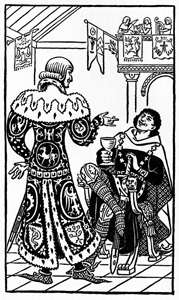The Silver Stallion
An Interview With William L. Godshalk, Part I
 I met with William Leigh Godshalk (Professor, University of Cincinnati), at one of Lichfield’s less reputable watering-holes. After a couple rounds of nectar-of-the-gods, we got down to the business of talking about the journal “Kalki: Studies in James Branch Cabell” which was published from 1965 to 1993…
I met with William Leigh Godshalk (Professor, University of Cincinnati), at one of Lichfield’s less reputable watering-holes. After a couple rounds of nectar-of-the-gods, we got down to the business of talking about the journal “Kalki: Studies in James Branch Cabell” which was published from 1965 to 1993…
SS: In 1968 you began contributing to Kalki, and in the Spring of 1969 you became James Blish’s co-editor there. But you had already written about Cabell in a journal published at his own alma mater back in 1967. How did that happen? how did you become involved in Cabell studies?
WLG: I arrived at William and Mary in 1964 with a brand new Harvard Ph.D. and absolutely no knowledge of James Branch Cabell. I learned about him from one of my students, Anne MacFarlane. I told her that I was working on an academic paper on mythology and literature, and Anne recommended that I read The Silver Stallion -- which I did, and my interest in Cabell grew.
When I learned that Cabell had attended William and Mary, I started digging around in the college archives, and I found some curious silences that I tried to explain in an article, "James Branch Cabell at William and Mary: The Education of a Novelist," The William and Mary Review, 5 (1967). Shortly after its publication, Anne MacFarlane (later to be my wife), and I were called to the home of JBC on Monument Boulevard, in Richmond, Virginia, by Margaret Cabell, Mrs. James Branch Cabell, Cabell's second and much younger wife.
Margaret had heard about my article, and she wanted to give me her take on those silences at William and Mary. According to rumor, Cabell had been involved in a homosexual bash after the girls had been taken home. This bash was possibly under the direction of the college librarian, Charles Coleman, who resigned -- no mention of a homosexual orgy. But Margaret Cabell wanted to know what had really happened. She questioned JBC carefully, and he told her that he was too drunk to remember what happened. He stuck to his story, and Margaret seemed to accept it. It seems to me that Charles Coleman was the model for John Charteris who has his library at Willoughby Hall in Fairhaven (Williamsburg). Anne and I were often invited by Margaret. Here we met Ballard, Cabell's challenged son, and Edgar MacDonald, Cabell's biographer. And here we learned that Jim Blish was also a recurrent visitor at the Cabell house.
SS: So you met Blish through Margaret Cabell?
WLG: I think that Margaret got Jim and me together by mail. Later we met during a high level meeting of the Cabellians in New York during a Modern Language Association Meeting.
SS: Cabellians! who else was there? what did they drink?
WLG: Bill Jenkins was there, as I recall. He drank vodka and was editor of the Tobacco Journal, and a hard core Cabellian, and was a good friend of Jim's. He wore many hats.
SS: I was going to ask you about his hats, as I know he also wrote on Conan Doyle and James Joyce. Was anyone there from the other Cabell journal The Cabellian? I’m surprised the two groups didn’t end up merging or at least working more closely together. From what I read in back issues of both Kalki and The Cabellian it appears there was some interest in that approach, but The Cabellian’s editor, Julius Rothman, seems to have stonewalled – was he territorial concerning Cabell studies?
WLG: Julius Rothman sat apart on a deep chair. He was not a happy camper. He told us to our joint surprise, that he had never really liked Cabell's writing. If so, what was he doing as editor of a Cabell journal? In any case the two Cabell groups were not united. Jim thought that Lin Carter's decision to reprint some of Cabell's work in paperback would make us wealthy. It didn't work that way, and Jim must have been depressed, but he didn't show it, and he soldiered on -- cancer and all.
SS: Yes, Blish certainly did contribute a lot to Cabell studies. But by 1971 he had moved to England and left you as sole Kalki editor (though he still contributed), and then died just a few years later. [The peanut bowl is refilled and we spend a couple minutes eating.] So, tell us about James Newell Hall Jr. He started Kalki and was its editor from 1965 to 1967, when Blish took over -- I wonder how Blish got together with Hall.
WLG: James N. Hall remains a puzzle. He called Kalki a fanzine, so perhaps he met Jim at a con. Hall's first issues of Kalki are in decaying, mimeographed sheets. These were reissued by Jim. I have a boxed copy.
SS: After turning Kalki over to Blish, Hall devoted his energies to compiling the landmark work James Branch Cabell: A Complete Bibliography, which was finally published in 1974.
WLG: I think that Hall was in the main a bibliographer. He would write to me and ask me to check a reading in the local libraries. I was of little help, I fear. His address was c/o Fimbulwinter Press in Crystal City, Missouri.
[At this point the Lichfield Police, accompanied by the Society for the Suppression of Vice, kicked the door down and raided the jernt, so we had to postpone the rest of our conversation. More to come…]
NOTE (2015):
We had planned on offering further installments of our conversation with William L. Godshalk, but have been anticipated by Grandfather Death. Ave atque vale, WLG.